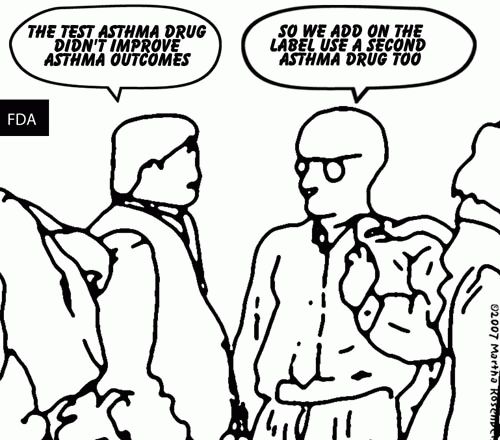Long acting beta agonists as found in Symbicort, Dulera, Foradil, Advair Diskus and Serevent Diskus, (LABAs) are not the only asthma drugs with questionable safety and effectiveness that have become billion dollar businesses for Pharma. Singulair, a leukotriene receptor antagonist or LTRA, was the nation's seventh most popular drug last year, according to IMS health and earned more than $4 billion . It ranks only two places below Advair in sales. Other LTRAs are Accolate and Zyflo.
Singulair is heavily marketed to kids for allergies, in addition to asthma, and even comes in a cherry-flavored chewable formulation. Marketing included a partnership with Olympic gold-medalist swimmer Peter Vanderkaay, a basketball "skills challenge" for kids 9 to 14 and materials distributed through (and legitimized by) Scholastic and the American Academy of Pediatrics, said published reports.
Sales pieces from Scholastic and Merck (who makes Singulair) called, "Health Ed 101-- Learn to Prevent Asthma Symptoms," told parents, "When your child breathes in an asthma trigger, such as pollen from trees or weeds, the body releases leukotrienes (loo-ko-TRY-eens)" and that Singulair blocks the loo-ko-TRY-eens.
The Scholastic sales piece says Singulair is "steriod-free," implying safety from steroid side effects. But parents are also told that Singulair, "is not a rescue medication. Always carry your child's prescribed rescue inhaler for emergencies or sudden symptoms. If asthma symptoms get worse or your child needs to increase the use of fast-acting medicines, call the doctor at once." Why is a drug that needs to be used with a second drug (like the LABAs Symbicort, Dulera, Advair Diskus) and that may make asthma worse, a bestseller?
Parents are also told that kids on Singulair may experience, "hallucinations (seeing things that are not there), irritability, restlessness, sleepwalking, suicidal thoughts and actions (including suicide), trembling, and trouble sleeping." Hey, it may help runny noses!
A slew of Pharma-backed journal articles support Singulair kids' sales by elevating allergies into a major health problem. One article in Current Opinion in Internal Medicine warns that, "Patients with allergic rhinitis often have a reduced quality of life (QOL) not only due to the symptoms of allergic rhinitis (sneezing, nasal, pruritus, rhinorrhea, and congestion) but also because the pathophysiology of allergic rhinitis can disrupt sleep," which causes, "fatigue, irritability, memory deficits, daytime somnolence, and depression."
But some FDA drug reviewers were agnostic about Singulair's actions in children from the start. In the New England Journal of Medicine, soon after Singulair was approved, FDA reviewers cautioned that adult studies of the drug "may not be predictive of the response," in children. In FDA new drug approval documents in the late 1990s, reviewers note that Singulair levels in adolescents are different from "healthy adults," and that an infant monkey, four weeks old, had to be euthanized because "infants may be more sensitive to the toxicity," of Singulair. Three out of five guinea pigs also died from "severe anaphylactic responses." (If animal tests do not extrapolate to human safety, why are they done?)
(Note: You can view every article as one long page if you sign up as an Advocate Member, or higher).






